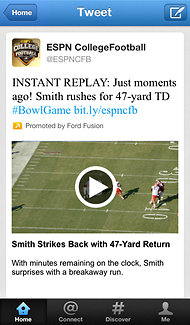Apple’s newest music feature, iTunes Radio, will be released on Sept. 18 as part of its iOS 7 system update, the company announced on Tuesday. The service is a sleek take on Internet radio, and Apple’s ability to place the app on millions of its devices gives it an enormous potential audience from Day 1.
“It’s a huge opportunity on a global basis to accelerate the transition of radio listeners and advertising dollars from terrestrial to digital,” said Stephen Bryan, the executive vice president for digital strategy at the Warner Music Group, which releases music by Green Day, Bruno Mars and hundreds of other acts.
The service is a threat to Pandora Media, which dominates Internet radio. But music and advertising executives say that the magnitude of that threat is unclear, given Apple’s relatively late entry into streaming music and Pandora’s strong market position. Both offer free streams of music tailored to a user’s taste and supported by advertising. In August, Pandora had 72.1 million active users — almost all in the United States — who streamed 1.35 billion hours of music, according to data released by the company.
“At this point Pandora is one of the leading recipients of mobile advertising revenue, and is one of the most popular apps, period, across devices,” said Clark Fredricksen, a vice president at eMarketer, a research firm. “It’s tough to see it getting killed.”
Instead, record labels and music publishers hope that Apple’s immense marketing power will attract more advertisers and help popularize Internet radio around the world. ITunes Radio will at first be available only in the United States, but it is expected to be introduced internationally soon. Apple operates iTunes stores in 119 countries.
“It’s hard to say that Pandora hasn’t helped make Internet radio mainstream already,” said Glenn Peoples, the senior editorial analyst at Billboard. “But iTunes Radio can help it grow and can change the impressions of it in the minds of advertisers and sponsors.”
Apple is the single largest retailer of music, its downloads providing labels a crucial source of revenue as sales of CD’s drop. One feature of iTunes Radio that music companies are particularly grateful for is a prominent button to buy a song as it streams. Subscribers to Apple’s iTunes Match feature, for $24.99 a year, can have that song instantly linked through the cloud to all of their Apple devices.
In the economy of digital music, one 99-cent download can be worth more than hundreds of streams. Apple’s deals with labels call for it to pay 0.13 cents for every song streamed on iTunes Radio during its first year of operation, according to reports in Billboard and elsewhere based on Apple’s licensing contracts. That is more than Pandora’s current rate of 0.12 cents, and Apple will also pay music companies a portion of the service’s advertising revenue.
Apple is entering an already crowded Internet radio market, which besides Pandora includes Clear Channel Communications’ iHeartRadio app; radio functions offered by on-demand services like Spotify; and others like Songza that supply ready-made playlists for various occasions, like working out or hosting a dinner party. This week Microsoft expanded its Xbox Music service, which includes a radiolike function, to work on Apple and Android devices.
So far Pandora’s investors have not fled. Since news of Apple’s plans first emerged a year ago, Pandora’s stock has roughly doubled. On Tuesday it closed at $20.35, up 1 percent for the day.

Article source: http://www.nytimes.com/2013/09/11/business/media/with-itunes-radio-apple-takes-aim-at-pandora.html?partner=rss&emc=rss
